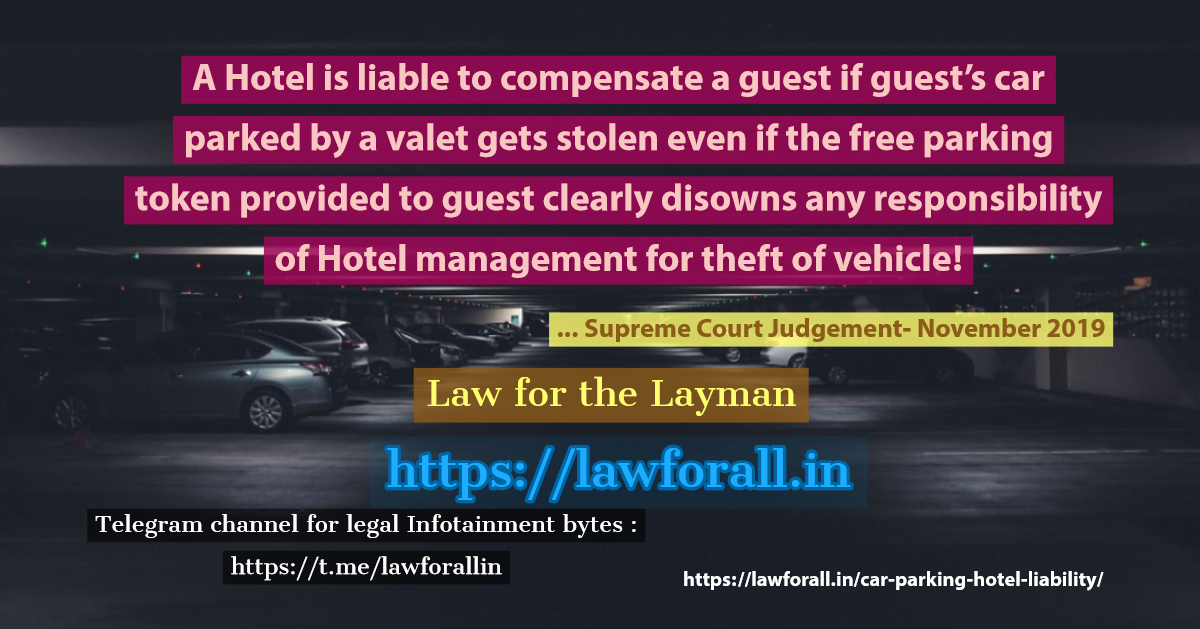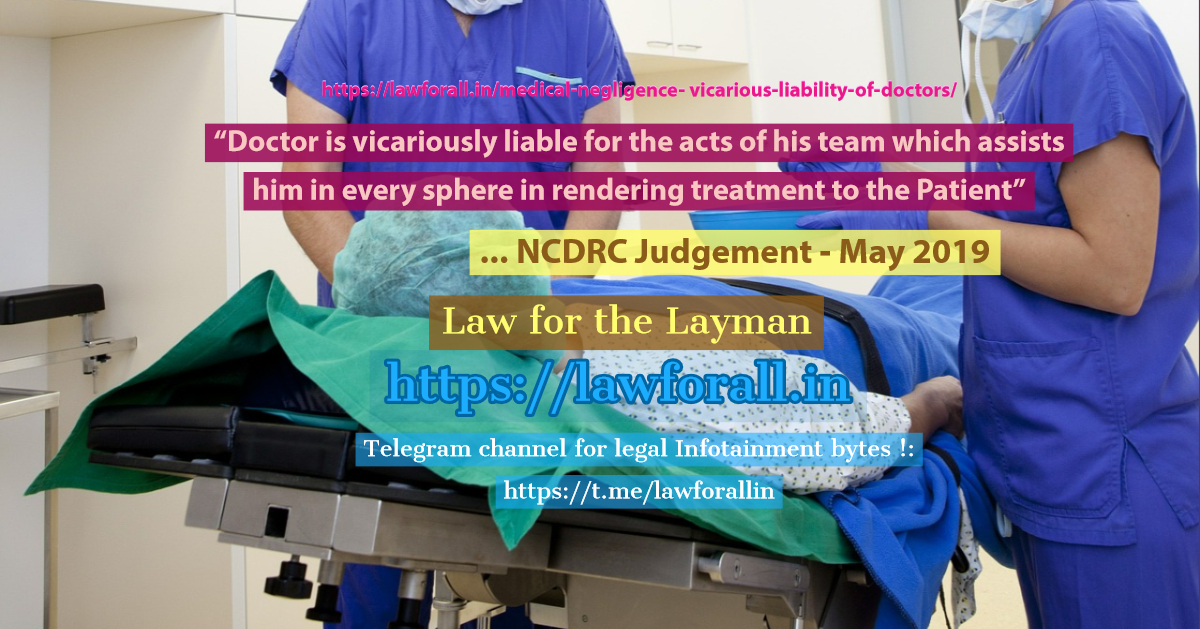In a recent ruling, the Supreme Court has held that hotels have liability to compensate guests if their car parked by a valet gets stolen even if the free parking tokens provided to guests clearly disown any responsibility of management for theft of vehicles.
Synopsis
- A Guest G used Valet Parking of a hotel H. The parking tag provided to him read : Important condition: This vehicle is being parked at the request of the guest at his own risk and responsibility in or outside the Hotel premises. In the event of any loss, theft or damage, the management shall not be held responsible for the same and the guest shall have no claim whatsoever against the management.”
- The Vehicle was stolen and G was awarded compensation (to G’s insurance company that filed the case under Power of Attorney and letter of subrogation from G) by State Consumer Commission, holding that H was negligent. National Forum upheld the order on appeal. H then challenged the order in the Supreme Court.
Honorable Supreme Court held, in essence::
- There exist two approaches towards liability of innkeepers for loss/damage to guest vehicles. The earlier ‘common law’ approach imposes a strict liability upon the innkeeper irrespective of whether he was negligent or not, and excuses him only if the damage was due an act of God, Enemy or fault /negligence of the guest himself. This is the concept of ‘infra hospitium’ ( latin for ‘within the hotel’) , and this approach had been used by the National Commission while holding H liable.
- However, increasingly the infra hospitium principle is being discarded in favor of the more current moderate ‘prima facie liability’ rule, given the changes in times. Under this rule a hotel is presumed liable for loss or damage to vehicles in its care, but can rebut the presumption by showing that the loss did not arise due to negligence on its account. The prima facie rule is premised on existence of a bailment relationship and should be applied when such a relationship is found to exist between a hotel and its guests, in respect of vehicles so bailed to the hotel.
- The National Commission erred in deciding the case on basis of Infra Hospitium/ strict liability rule. A person may visit a hotel in several situations- meetings, conferences, wedding etc. The Hotels cannot be expected to maintain surveillance of each and every vehicle parked on their premises all the times. Hence, holding a hotel strictly liable, without any proof of any negligence on its part, may lead to grave injustice.
- At the same time, persons parking their cars in Hotel premises or under valet parking cannot be held at mercy of hotel owners. Hence, the prima facie liability rule should be used if a bailment relationship is found.
- Valet parking offered by H provided it an edge over other hotels since it was of greater convenience to visitors. Even if offered free, it benefited H as it assisted the Hotel in receiving more footfalls due better guest experience. Therefore, for such cases, there exists an implied consideration for the contract of bailment created by virtue of the valet parking service.
- Hence, H cannot refute the existence of bailment by contending that its valet parking service was purely complimentary in nature and that the consumer had not paid for the same. In other words, the existence of a bailment relationship is clear.
- Hence, given the existence of a bailment relationship, the failure of H to deliver the car to G raised a prima facie case of negligence against it. The burden of proof was on H to show that the theft did not occur due to its neglect or misconduct.
- The specific circumstances of the case showed that H had been negligent.
- Hence H was bound to indemnify the loss of G under Sections 148 and 149 of the Contract Act, 1872.
Section 148 in The Indian Contract Act, 1872
148. ‘Bailment’, ‘bailor’ and ‘bailee’ defined.—A ‘bailment’ is the delivery of goods by one person to another for some purpose, upon a contract that they shall, when the purpose is accomplished, be returned or otherwise disposed of according to the directions of the person delivering them. The person delivering the goods is called the ‘bailor’. The person to whom they are delivered is called the ‘bailee’.
Explanation.—If a person is already in possession of the goods of other contracts to hold them as a bailee, he thereby becomes the bailee, and the owner becomes the bailor of such goods, although they may not have been delivered by way of bailment.
Section 149 in The Indian Contract Act, 1872
149. Delivery to bailee how made.—The delivery to the bailee may be made by doing anything which has the effect of putting the goods in the possession of the intended bailee or of any person authorized to hold them on his behalf.
Click here for the complete order.
We are also on :
LinkedIn : https://www.linkedin.com/company/lawforall
Facebook: https://www.facebook.com/lawforallin/
Twitter : https://twitter.com/legalnatter
Instagram: https://www.instagram.com/lawforallin/




